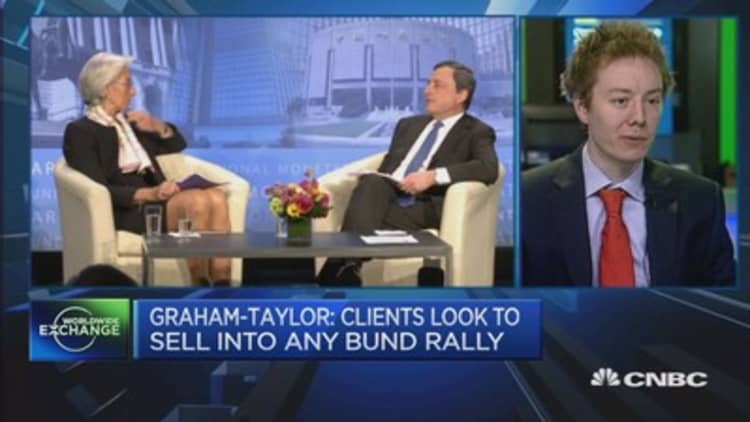European Central Bank head Mario Draghi said that "growth is too low everywhere" in the 19-country eurozone despite a modest recovery.
Draghi made the blunt remark as he opened a conference on the unemployment problem plaguing several of the European Union member countries that share the euro currency.
"Recently, economic conditions have improved somewhat in Europe," he said at the ECB's conference on inflation and unemployment in Sintra, Portugal. "But growth is too low everywhere."
He said that inflation was too low — a sign of economic weakness — and that "people in Europe are frustrated by the lack of growth they have witnessed in recent years."
Read MoreECB controversyover speech that sank the euro
Draghi's remarks come as the eurozone shows increasing signs of recovery. The economy grew 0.4 percent in the first quarter, and growth this year may be strong enough to start whittling down an unemployment rate of 11.3 percent, economists say. Still, it could take years to achieve a significant reduction in the jobless rate, which remains painfully high in the weaker member countries. Youth unemployment is 50 percent in both Greece and Spain.
The eurozone also faces a challenge in Greece, where the government is struggling to pay its debts despite two rounds of bailout loans from other eurozone countries and the International Monetary Fund. A default could lead Greece to leave, raising questions about the currency union's permanence.

Draghi's growth call was echoed by a top U.S. Federal Reserve official at the conference. Fed Vice Chair Stanley Fischer said the euro's crisis has led to new institutions such as EU-level banking supervision and procedures to wind up bad banks to spare taxpayers the costs of bailouts.
Fischer said the euro appeared to have weathered the current crisis but warned that "in the longer run," the monetary union "will not survive unless it also brings prosperity to its members."
U.S. officials have pressed Europe to tackle its growth problem. The eurozone remains a key market for many U.S. firms and its health is an important factor for the global economy.
Read MoreGreek crisis talksas Tsipras, Merkel meet
The eurozone has struggled with a crisis over too much government and bank debt since Greece reported its deficit was out of control in 2009. Greece, Portugal, Ireland, and Cyprus have been bailed out by other members, and Spain got a bailout for its banks. European governments are facing lower than desired growth and high unemployment as they restrain spending to try to reduce debt. Governments such as those in France and Italy are struggling to make their economies more business-friendly.
Fischer said that recent measures taken to strengthen the 16-year-old euro — such as EU level supervision carried out by the ECB — would probably not have been agreed on by political leaders without the euro crisis.
But he said that the union faced further challenges, such as the lack of a common budget. Leaving budget decisions to individual governments risks overspending by some. It also deprives the union of a common fiscal pot to even out recessions in individual countries.
"The decision to use the single currency to drive the European project forward was a risky one, and at some stage or probably in several stages, it will be necessary to put the missing fiscal framework into place," Fischer said.

